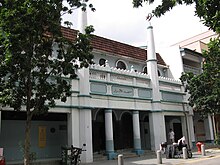Masjid Al-Abrar: Difference between revisions
Remove tag |
null edit |
||
| Line 31: | Line 31: | ||
==History== |
==History== |
||
[[Image:Al-Abrar Mosque 2, Jan 06.JPG|thumb|right|220px|The [[minaret]]-like towers on the front façade of the mosque.]] |
[[Image:Al-Abrar Mosque 2, Jan 06.JPG|thumb|right|220px|The [[minaret]]-like towers on the front façade of the mosque.]] |
||
The early Tamil immigrants first established the Masjid Al-Abrar in 1827 with a makeshift [[thatch]]ed [[Hut (building)|hut]] that they used for worship until it was replaced by a brick building between 1850 and 1855.<ref name="infopedia">{{cite web |title=Al-Abrar Mosque |url=http://eresources.nlb.gov.sg/infopedia/articles/SIP_519_2004-12-24.html |work=Singapore Infopedia |publisher=National Library Board}}</ref> |
The early Tamil immigrants first established the Masjid Al-Abrar in 1827 with a makeshift [[thatch]]ed [[Hut (building)|hut]] that they used for worship until it was replaced by a brick building between 1850 and 1855.<ref name="infopedia">{{cite web |title=Al-Abrar Mosque |url=http://eresources.nlb.gov.sg/infopedia/articles/SIP_519_2004-12-24.html |work=Singapore Infopedia |publisher=National Library Board}}</ref> |
||
Between 1986 and 1989, major [[renovation]]s were carried out, and the capacity was expanded to allow up to 800 worshippers in the mosque.<ref name="roots" /> An adjacent shophouse was converted into a [[madrasa]] and a prayer hall for women in 1998.<ref name="infopedia" /> |
Between 1986 and 1989, major [[renovation]]s were carried out, and the capacity was expanded to allow up to 800 worshippers in the mosque.<ref name="roots" /> An adjacent shophouse was converted into a [[madrasa]] and a prayer hall for women in 1998.<ref name="infopedia" /> |
||
| Line 71: | Line 71: | ||
[[Category:Outram, Singapore]] |
[[Category:Outram, Singapore]] |
||
[[Category:Indian diaspora in Singapore]] |
[[Category:Indian diaspora in Singapore]] |
||
[[Category:19th-century architecture in Singapore]] |
|||
Revision as of 22:28, 12 March 2023
| مسجد الأبرار Masjid Al-Abrar Al-Abrar Mosque | |
|---|---|
Masjid Al-Abrar, Kuchu Palli | |
 | |
| Religion | |
| Affiliation | Islam |
| Location | |
| Location | 192 Telok Ayer Street Singapore 068635 |
| Geographic coordinates | 1°16′49″N 103°50′50″E / 1.280278°N 103.847222°E |
| Architecture | |
| Type | Mosque |
| Style | Indo-Islamic |
| Date established | 1827 |
| Completed | 1855 |
| Designated as NHL | |
| Designated | 19 November 1974 |
| Reference no. | 10 |
Masjid Al-Abrar (Malay for Al-Abrar Mosque; Jawi:مسجد الأبرار) is a mosque located along Telok Ayer Street in Chinatown within the Central Area, Singapore. It is one of the earliest mosques in Singapore.[1]
The building was gazetted as a national monument on 19 November 1974.[2]
History

The early Tamil immigrants first established the Masjid Al-Abrar in 1827 with a makeshift thatched hut that they used for worship until it was replaced by a brick building between 1850 and 1855.[3]
Between 1986 and 1989, major renovations were carried out, and the capacity was expanded to allow up to 800 worshippers in the mosque.[2] An adjacent shophouse was converted into a madrasa and a prayer hall for women in 1998.[3]
Masjid Al-Abrar was designated a national monument on 19 November 1974. The mosque is currently administered by the Islamic Religious Council of Singapore.[2]
Architecture
The design of the building is based on Indo-Islamic architecture with two tall minarets at the front.[2]
The building was built along a row of shophouses, and the frontage incorporated a five-foot way (1.524 m) that connects the walkway of the other shophouses.[2]
Transportation
The mosque is accessible within walking distance from Telok Ayer MRT station.
See also
References
- ^ "Jamae Mosque". Your Singapore.
- ^ a b c d e "Al-Abrar Mosque". Roots. National Heritage Board.
- ^ a b "Al-Abrar Mosque". Singapore Infopedia. National Library Board.
- National Heritage Board (2002), Singapore's 100 Historic Places, Archipelago Press, ISBN 981-4068-23-3
